What is metabolism?
Metabolism is the catch-all phrase for all the chemical and physical processes in the body that are necessary to maintain life. Specifically, your body extracts energy from food, and you use this energy to live: breathe, circulate blood, and move your muscles, among many other biological functions. There’s also a connection between your metabolism and your weight, which is why many people want their metabolism working efficiently. Read on to learn about simple ways you can boost your metabolism and keep it in tip-top shape.

Play footsie… with yourself
Are you a toe-tapper? A pencil twirler? A leg shaker? Don’t stifle it—all these little movements can bolster your metabolism. Fidgeters can burn more calories each day without even thinking about it. According to a 2018 review in the Journal of Exercise Nutrition & Biochemistry, obesity was linked to lower levels of non-exercise activity thermogenesis (NEAT)—or calorie burning from non-exercise movement. Here are 50 things your doctor wants you to know about losing weight.

Down a cup or two of coffee
Caffeine is a central nervous system stimulant and your daily java can rev your metabolism anywhere from three to 11 percent, according to research in the American Journal of Clinical Nutrition and the Annals of Nutrition and Metabolism. This helps you burn an extra 98 to 174 calories a day, says Julie Lohre, a certified personal trainer, nutrition specialist, and former competitor on NBC’s American Ninja Warrior. Drinking your cup of coffee before your workout can also help you stay more focused on your exercise, which can also boost your metabolism, she adds.

Try a Breathe-Right Nasal Strip before bedtime
When it comes to your metabolism, sleep is the reset button. So if yours is constantly interrupted by snoring or sleep apnea then you’re missing out on some of the calorie-burning benefits, says Bindiya Gandhi, MD, a family medicine doctor in Decatur, Georgia, who is also an integrative and functional medicine specialist. The fix to bad sleep may be as simple as using a breathing strip on your nose at night or adjusting your sleeping position. Try one of the best vitamins for sleep.

Curl up on the couch with your favorite flick
Wait—being a couch potato can help your metabolism? If you’re totally relaxed, then yes. Stress increases the level of the hormone cortisol, which can cause metabolic dysfunction if it’s constantly elevated, explains Dr. Gandhi. The cure is to do something that will help you completely de-stress. Taking a long bath, walking outside, and reading a book are all great options to chill out, but if your favorite method is watching a movie that’s cool too, as long as that’s not all you do.

Make your nightcap a cup of chamomile tea
Even just one or two alcoholic drinks a day can disrupt your metabolism, increasing your risk of type 2 diabetes and other metabolic disorders, Dr. Gandhi says. Skip the booze altogether or save it for special occasions and learn to wind down at the end of the day with a different beverage. Herbal teas are soothing, no-calorie options that won’t keep you up at night. If you need help cutting back on booze, try these 17 tips.

Watch the sunrise
Getting a little sunlight on your face every morning boosts both your body and your mood, says Ken Ceder, executive director of Science of Light, a nonprofit focused on the benefits of natural light. To get your daily dose, you need to spend at least 15 minutes every morning outdoors, in the sunlight, without sunscreen or sunglasses on. Simply taking in the sunrise can help you lose weight and increase your metabolism naturally, he says. If the sun isn’t cooperating, consider using a lightbox—it’s just one of the 14 ways you can help avoid seasonal affective disorder this season.

Squat down to pick things up
Doing “composite movements”—any movement that uses more than one muscle group—can elevate your metabolism for 24 to 48 hours, says Ron Erlich, a board member of the Australasian College of Nutritional & Environmental Medicine and author of A Life Less Stressed. Compare that to going for a run, which may burn more calories but only raises your metabolism for a few hours afterward, he says. You don’t have to be a gym rat to benefit. Many of these compound movements can be a part of your everyday life—think of chores, gardening, and even putting away the groceries. This is exactly how many calories you burn doing common household chores.
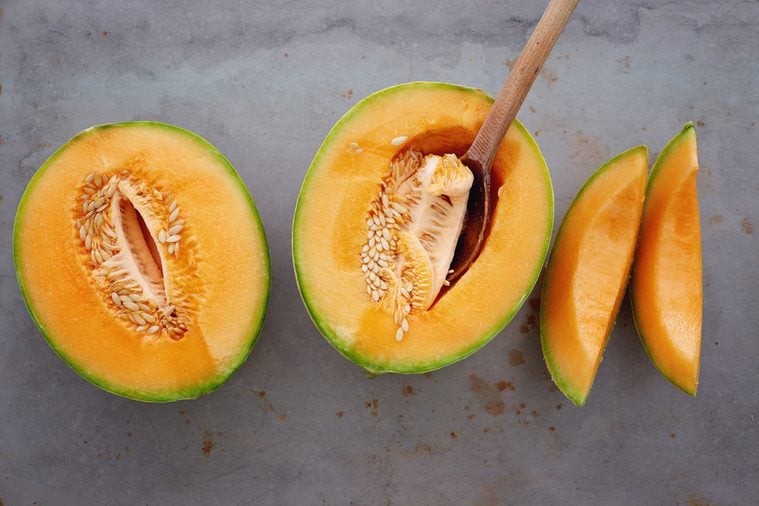
Cantaloupe, not cupcakes
Simple, refined carbohydrates, like the kind found in junk food, are metabolism killers, Erlich says. These can help elevate your blood sugar and promote insulin resistance, he explains. This doesn’t mean you can never have a cupcake or some chips again, but next time you crave something sweet, try satisfying yourself with a piece of fruit first. Bonus: Fruit comes with fiber, which may help boost your metabolism.
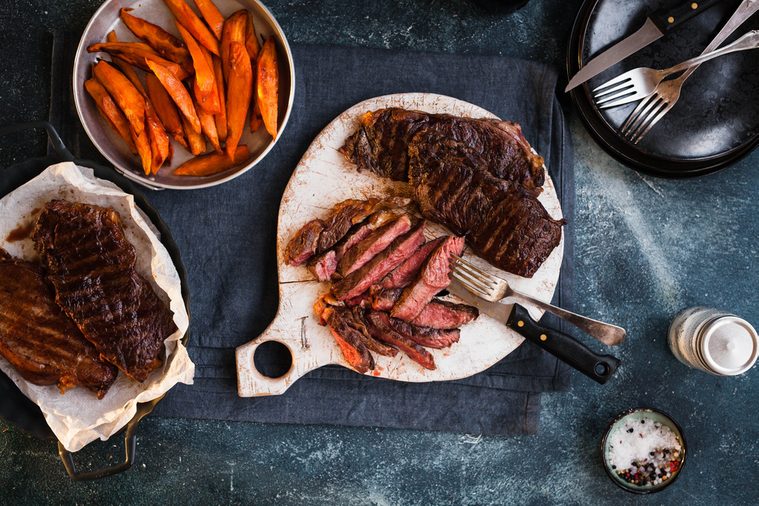
Enjoy more healthy fats
Fat is not the enemy when it comes to weight loss. In fact, eating the right kinds of fats—including olive oil, avocado, and nuts—may increase your metabolism, Erlich says. Healthy fats help regulate important hormones, including testosterone, and help you feel full longer so you don’t binge on junk food, he adds.

Facetime a friend in real life
“In today’s ‘attention economy,’ it is easy to get lost in the online world of social media and take your real-life, face-to-face relationships for granted,” Erlich says. Face-to-face time with friends and family has a ton of mental- and physical-health benefits and can tack on years to your life.

Quit your dangerous sitting habit
Sitting has been called “the new smoking”: Recent studies suggest that sitting for more than eight hours a day raises your risk of a whole host of health problems—and it can definitely slow down your metabolism, says Yasmine S. Ali, MD, president of Nashville Preventive Cardiology, and an assistant clinical professor of medicine at Vanderbilt University School of Medicine in Tennessee. This one has an easy fix: Take a break every hour and stand up—or get a desk that allows you the option of standing while you work. Here are tips to help you recover from a day of sitting.

Chill out—literally
Cold is one of nature’s most powerful metabolic boosters, helping increase your levels of “brown fat,” a type of fat that burns more calories, even at rest. “Going outdoors in cold weather can increase your non-exercise thermogenesis (NEAT) score, helping you torch calories,” says Kristin Koskinen, a registered dietitian nutritionist in Richland, Washington. “The metabolic act of staying warm is an easy way to boost your metabolism without breaking a sweat.”
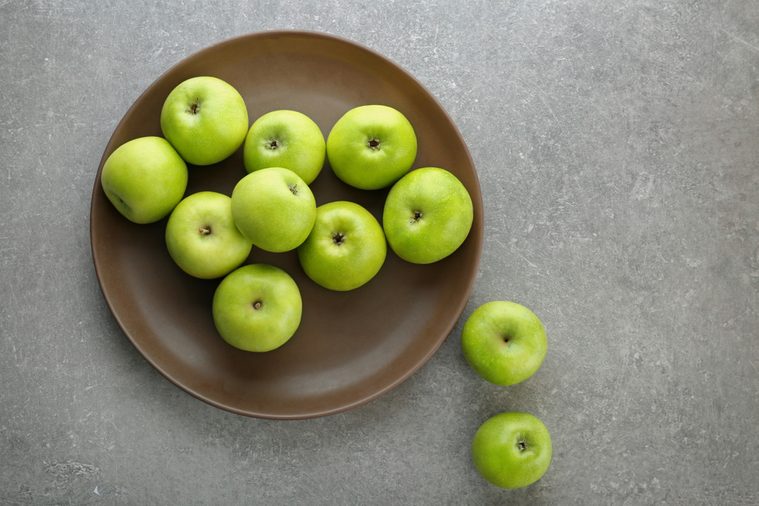
Eat an apple before eating anything else
Adding more apples to your diet can help your metabolism, Koskinen says. All you have to do is eat an apple before you eat anything else. “You don’t have to make any other dietary changes. This can decrease your overall calorie intake because of the satiety the apple provides,” she says. “I’ve seen clients increase their metabolism and lose 10 pounds by making this one change.”

Amp up your water
Drinking plenty of water is one of the best things you can do to support a healthy metabolism but, let’s face it, plain old’ H2O can get boring. To help you drink more of it, Koskinen recommends adding flavor to your water with sliced fruit or frozen berries. Or try changing the temperature for an extra metabolic increase. Nothing wakes you up like hot lemon water, she says. Try these additional genius tricks for drinking more water throughout the day
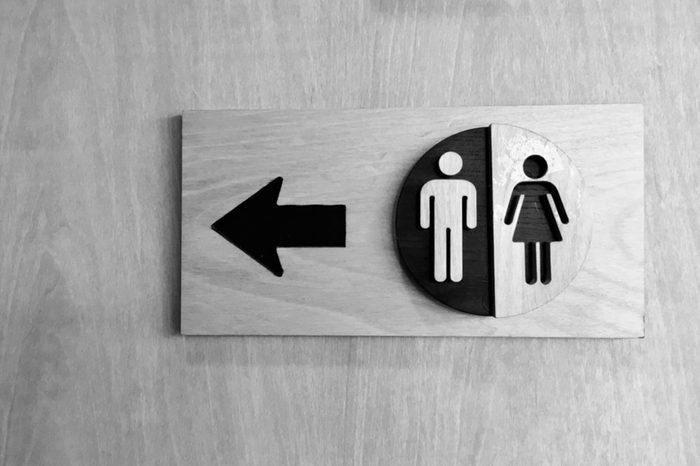
Use the bathroom on a different floor
When it comes to increasing your metabolism, every little bit of movement helps. So look for unusual ways to work in a few more steps, especially stairs, into your day, says Reggie Chambers, a personal trainer, and fitness specialist in NYC. One way to do this? Only use a bathroom located on a different floor of your office or home. Those runs up and down the stairs add up.
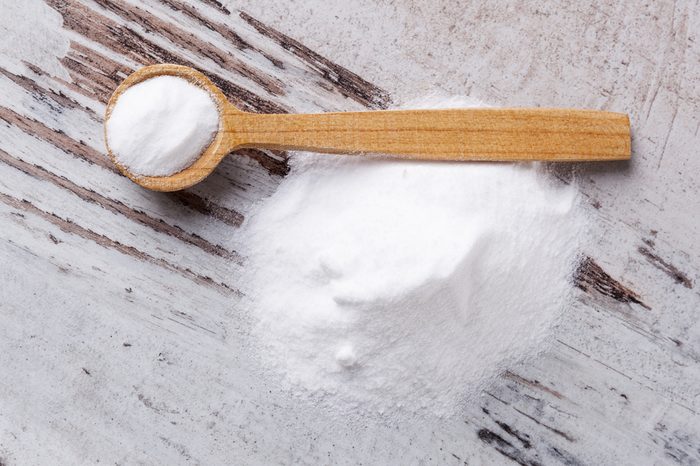
Make sure you get enough magnesium
Magnesium is one of the most important minerals for metabolic health, says Carolyn Dean, MD, of drcarolyndean.com, who is a book author. “Magnesium is required for the body to produce and store energy and yet 75 percent of Americans do not get their dietary reference intake (DRI) of this important metabolism-boosting mineral,” she says. You can find magnesium in leafy greens, seeds, nuts, legumes, and other foods. These benefits of magnesium could save your life.
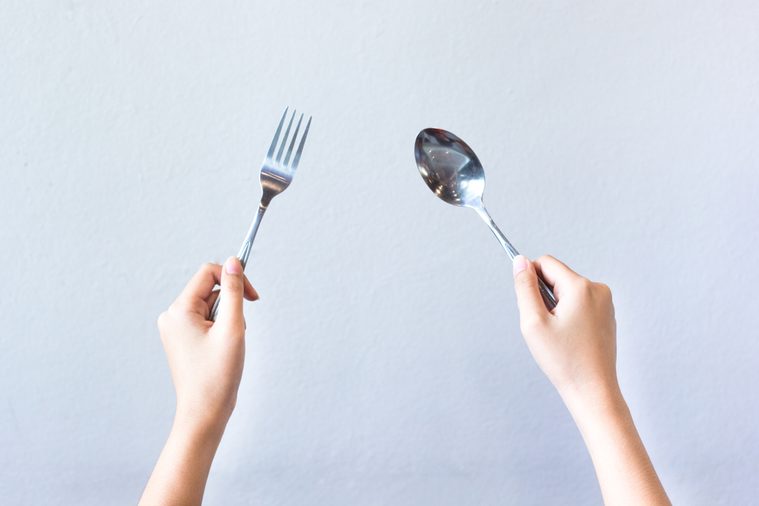
Eat something already
It’s common for people looking to lose weight to slash their calories. This can make you so tired and grouchy that you skip your workout or end up bingeing on junk food later. And several studies suggest that restricting calories can slow down metabolism, including a small, 2010 study in the journal Physiology & Behavior. It found that people who lost weight due to calorie restriction and fasting had a reduction in metabolic rate that played a role in their re-gaining of the weight. Discover the 11 metabolism myths that are hurting your weight loss.
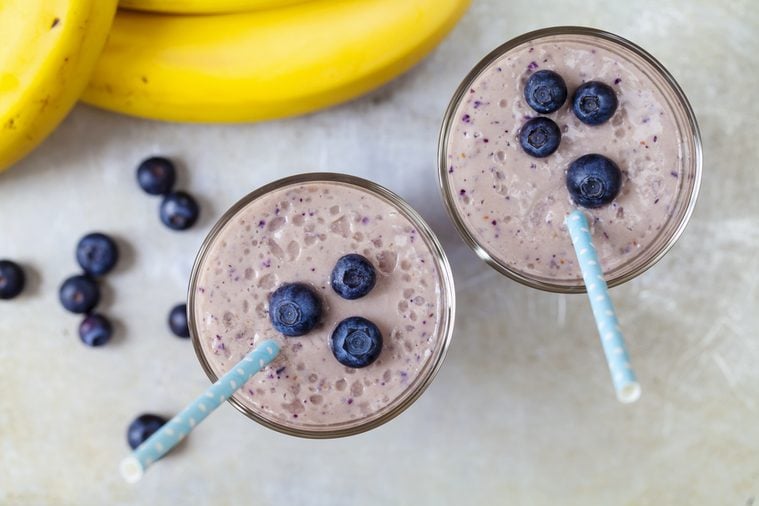
Add in a protein shake
You don’t have to be a bodybuilder to benefit from a protein shake. Many nutritionists themselves eat more protein to help the body burn more calories, even at rest. And protein shakes are an easy, cost-effective way to get more protein in your diet without having to turn on a stove.
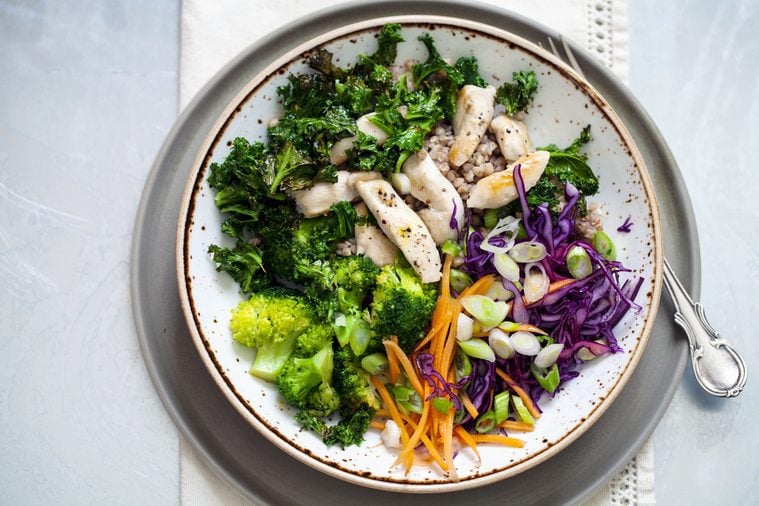
Eat your greens
Veggies take more work for your body to digest, helping increase the metabolic afterburn of your meal, says Scott Putnam, a plant-based nutrition expert at Whole Living Nutrition. “This extra calorie burn from eating plant foods can last up to four hours,” he explains. “It raises your metabolism, and the extra energy you’ll feel will make you want to move your body more.”
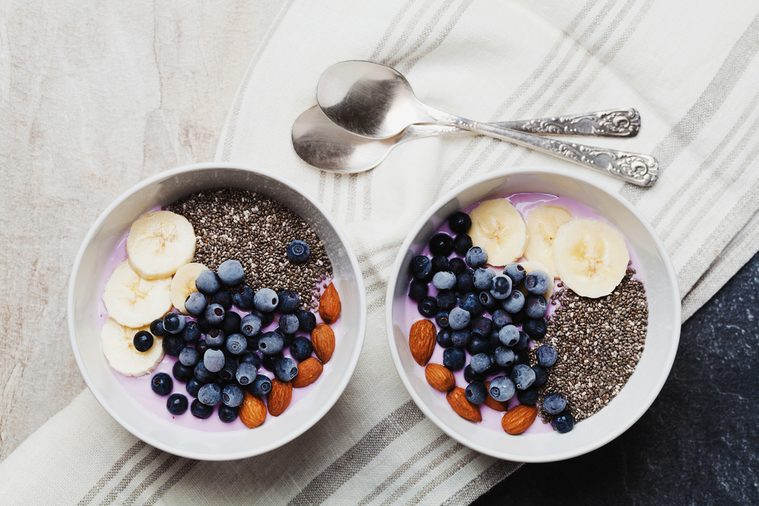
Go low-carb at breakfast
Skipping breakfast won’t necessarily kill your metabolism—that’s a metabolism myth—but what you eat can impact your metabolism for the rest of the day, says Catherine Metzgar, PhD, RD, a nutritional biochemist with Virta Health. “To improve your metabolism, I recommend that you start your day with low-carb, no-sugar foods that provide protein and enough fat that you’re not hungry,” she explains. Her favorite quick breakfast? Plain Greek yogurt topped with a handful of berries and nuts. Or try one of these high-protein breakfast ideas.
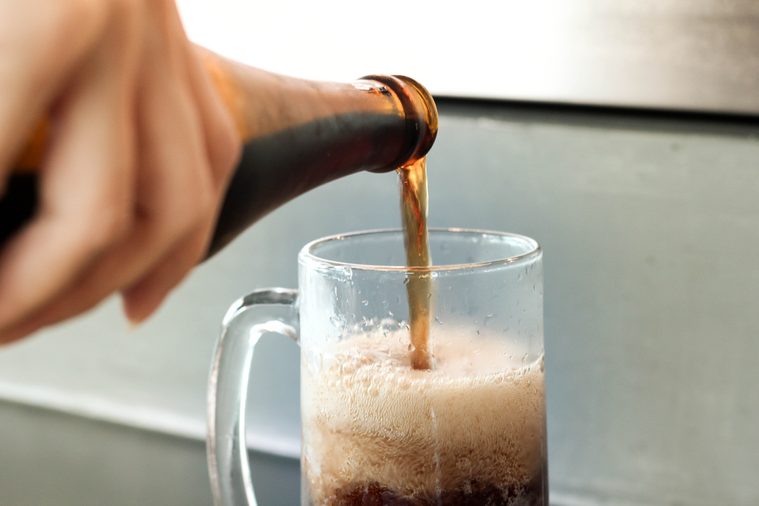
Skip the soda when eating out
What’s tastier than a hamburger with an ice-cold root beer? Lots of people love ordering a sweet drink along with their dinner, but a 2017 study in the journal BMC Nutrition suggests that drinking a sugar-sweetened beverage while eating a high-protein meal causes the body to store more of the meal as fat and slows down your metabolism. It maybe be a better idea to swap the soda for water or sparkling water. Don’t miss the 10 ways your body changes when you start drinking enough water.
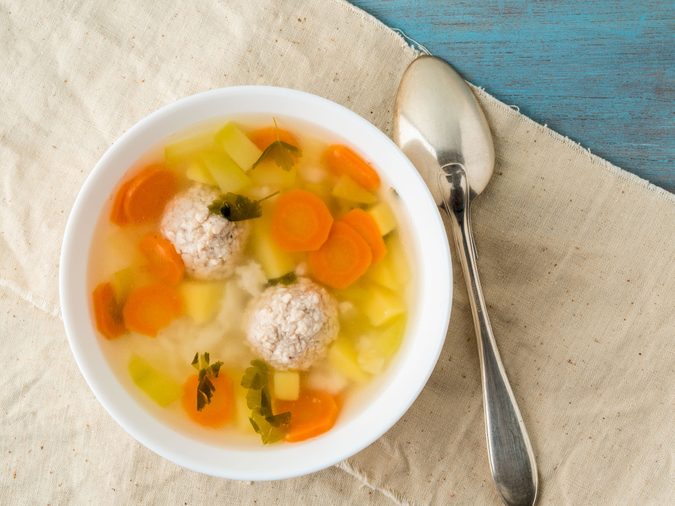
Divide your food into mini-meals
You don’t have to eat every two hours to keep your metabolism humming—yes, another myth—but for some people, eating a small, healthy snack a couple hours before a meal can help banish cravings and enable them to make wiser food choices because they’re not starving when they finally sit down to eat. Note: The serving shouldn’t be major—it can be as small as a cup of soup. These are the 15 weight-loss tips that doctors want you to stop believing.

Do a four-minute workout
Making your workout shorter can help you increase your metabolism for up to 24 hours afterward—as long as you’re also making it harder, says Terry Dubrow, MD, coauthor of The Dubrow Diet: Interval Eating To Lose Weight & Feel Ageless. Short bursts of interval training sprinkled throughout your week can increase your caloric burn by increasing excess post-exercise oxygen consumption, he explains. And it doesn’t take much; one study found that as little as four minutes a day can make a difference. Here’s everything you need to know about interval training.

Take a walk before dinner
Getting a little movement in before a meal—say, a walk around the block or some gentle yoga—fires up your metabolism, giving you more energy and encouraging your body to burn more calories throughout the day, says Dr. Dubrow. Here’s how to make walking burn more calories than running.
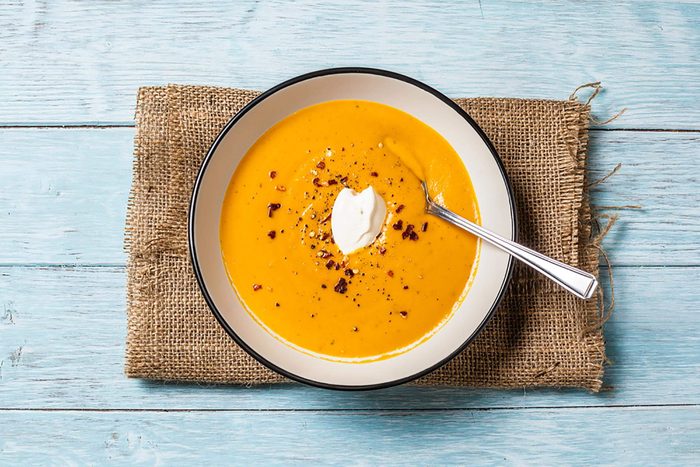
Get your pumpkin fix
You probably already know that pumpkin is delicious, but the healthy squash may also help boost metabolism, Lohre says. The trick is in the hefty dose of fiber it provides. “Research shows that fiber can rev your fat burn by as much as 30 percent,” she says. “Aim for at least 25 grams a day—the amount in about three servings each of fruits and vegetables.”

Drink up
You may be able to jump-start your metabolism as soon as you wake up by drinking a large glass of water. Founder of Hispanic Food Communications, Sylvia Melendez-Klinger, RD, suggests placing a glass by your bedside before you go to bed and drinking it first thing every morning. A 2016 study in the Journal of Human Nutrition and Dietetics suggested that people who drink more plain water take in fewer calories, sugar-sweetened beverages, and unhealthy fats than those who drink less. These are the easy ways to jump-start your metabolism.
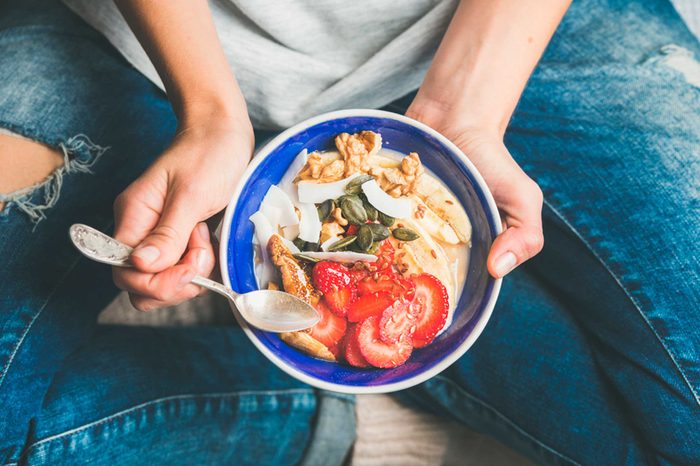
Never, ever skip breakfast
Eat breakfast within an hour of waking up to jump-start your metabolism. “Make sure to get enough protein at breakfast, at least 20 grams or the equivalent of 3 ounces, which is approximately the size of a deck of cards,” advises Lauren Pincus, RDN, author of The Protein-Packed Breakfast Club. “Breakfast is the time we often miss out on the opportunity to protect our muscles because we can only use about 25 to 35 grams of protein at a time for muscle growth and repair. Doubling up at dinner doesn’t help if you skipped protein at breakfast.” While meat or eggs contain protein, so do dairy, whole grains, nuts, seeds, beans, and veggies—and are therefore foods that may increase metabolism too.
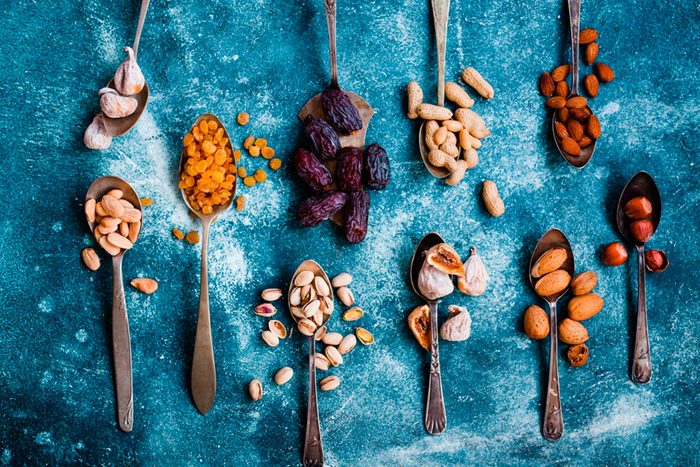
Nosh throughout the day
Learning how to boost your metabolism involves changing not just what you eat, but how and when you eat. Consuming several smaller meals instead of three large, heavy meals will help keep your metabolism and energy levels consistent throughout the day, advises dietitian Abby Sauer, RD, registered dietitian at Abbott. Score these tips to living longer.
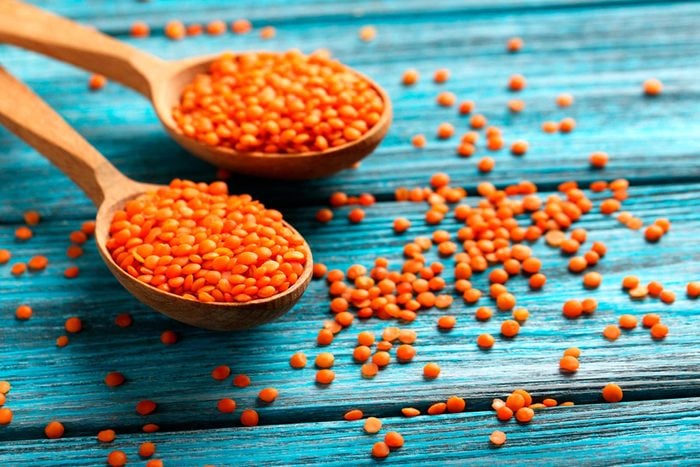
Eat foods high in B vitamins
Foods containing specific nutrients have been shown to play a role in metabolism. “Because your body needs help to convert carbs, protein, and fats from food into energy, eating foods high in B vitamins can help facilitate this process,” Sauer says. Try beans, lentils, whole grains, and most deeply colored vegetables such as kale or spinach. These metabolism myths are ruining your weight loss.

Increase lean muscle mass
Muscles aren’t just there to make your body look good—they play a key role in your metabolism. “Making it a habit to get up and get moving throughout the day or engaging in a weekly workout routine with forms of aerobic exercise such as walking, swimming, or cycling, can also decrease your body fat and increase lean muscle mass, which revs up your metabolism,” says Sauer.

Lift weights
Incorporating light weight-lifting to your fitness routine will build up muscle strength and also boost your metabolism. “Muscle is hugely metabolically demanding so the more muscle, the higher the basal metabolic rate,” explains clinical nutritionist Stephanie Moore.
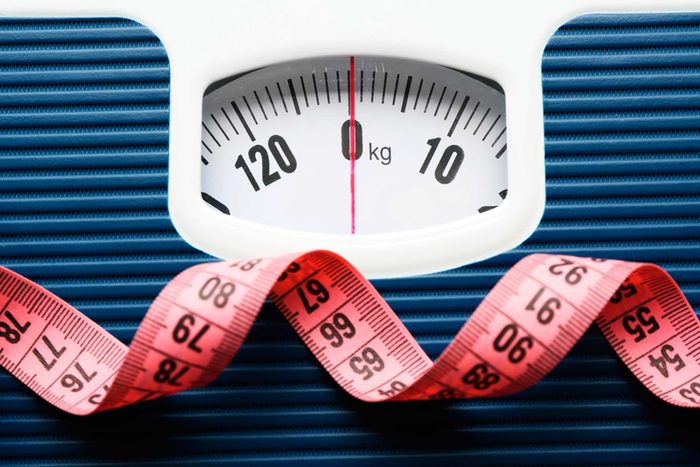
Avoid rapid weight loss
Figuring out how to increase your metabolism is crucial if you want to lose weight and keep it off. For optimum long-term results, don’t fall into the trap of trying to lose too much weight, too quickly. “This causes the body to drop its metabolic rate in an attempt to survive what it perceives to be a famine,” says dietitian and mindful eating coach Dina Garcia. Here are the medical reasons why you have a slow metabolism.
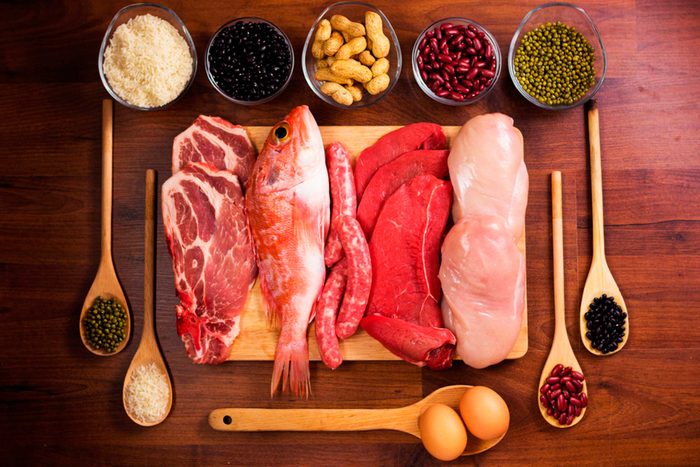
Remember PF3
Garcia recommends including PF3 (protein, fat, fiber, and fluid) in all meals, because these components help keep you satisfied and stabilize your blood sugar. “Protein and fiber also require a little more energy to digest than refined carbs,” she adds. These everyday things drain your energy levels.

Don’t skimp on z’s
If you don’t get enough good quality sleep, your metabolism could pay the price. “Lack of sleep can play a big role in your body’s ability to burn calories,” says Garcia. “Plus when you’re tired, you’re less motivated to hit the gym or opt for the stairs over the elevator.” Here are sneaky ways to walk more steps each day.
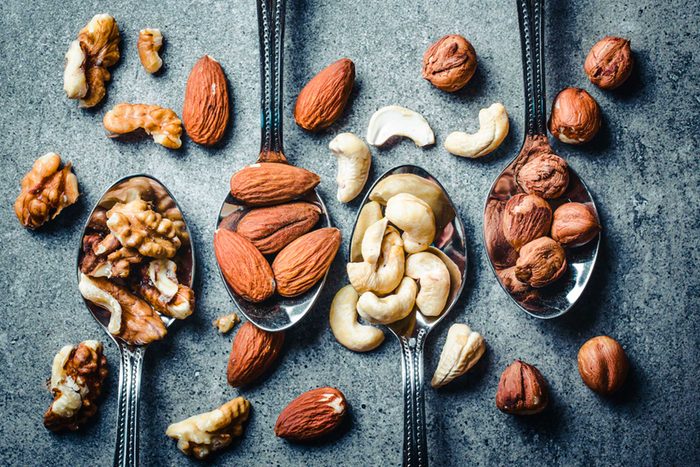
Snack smart
If you don’t consume enough throughout the day, your rate of metabolism may drop. Snacks are a great way to fuel your body, provided you do it the right way. “The key is to reach for foods and snacks that are nutritious and within your calorie requirements,” says Melendez-Klinger. “For snacks, one can easily consume 400-plus calories, so reach for foods that are satisfying and full of nutrients with no more than 200 calories each. For example, mandarin oranges are a great snack since they are sweet, easy-to-peel, and only 50 calories each. If you’re looking for something more filling yet nutritious, spread a tablespoon of your favorite nut or seed butter on whole wheat toast.” Here are the fat-burning foods you should be eating.
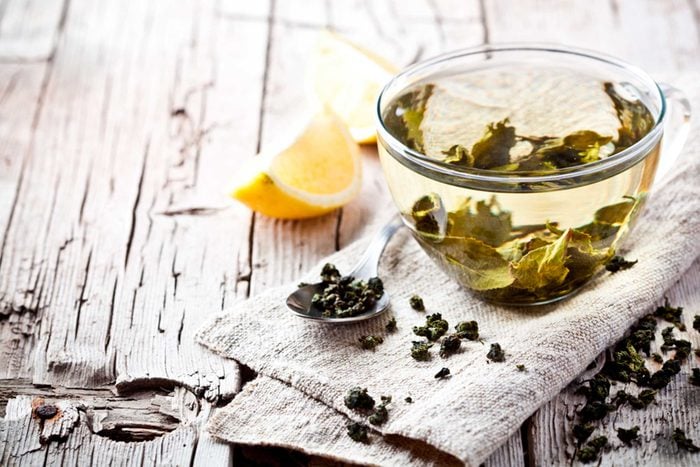
Sip green tea
Green tea is often revered for having many health benefits. “This warming (or cooling) beverage serves a dual purpose,” says Pincus. “Not only is it full of antioxidants and other healthy phytochemicals, but it has the benefit of slightly increasing your metabolism.” Pincus recommends sipping tea in the evening instead of snacking and trading in your usual latte for a cup of iced or hot green tea. Instead of adding sugar to sweeten it, consider trying enhanced flavors like pomegranate or blueberry green tea. For homemade iced green tea, add several tea bags to a two-quart container filled with water and let it steep overnight in the fridge.
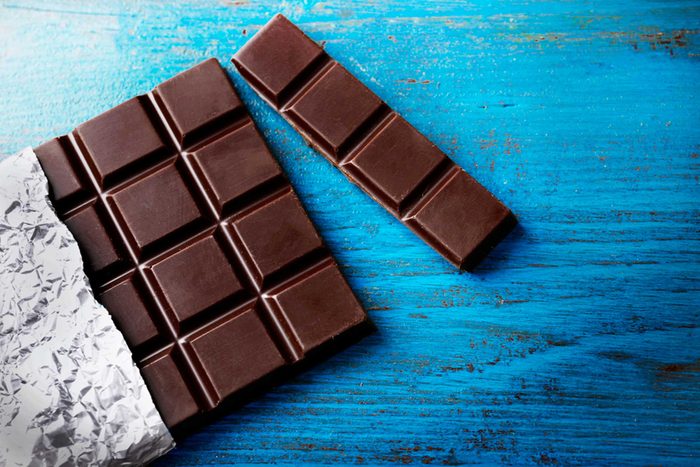
Enjoy (very) dark chocolate
Good news for chocolate lovers: “Dark chocolate—a great source of polyphenols, and flavanols in particular—has lately received attention for its possible role in modulating obesity because of its potential effect on fat and carbohydrate metabolism, as well as on satiety, the feeling of ‘fullness,'” writes Ian Wishart in his 2016 book Show Me The Money Honey.

Feed your gut
Healthy gut bacteria support fat-burning and metabolic function, so increase your intake of high-fiber and probiotic-rich fermented foods, all of which enrich your microbiome, which is the community of friendly gut bugs. “Probiotics are beneficial for our gut health, helping us have better digestion and also less bloating,” says Rebecca Lewis, in-house dietitian at HelloFresh. “Even more importantly, they directly influence the hormones our brains release, including cortisol (our stress hormone), ghrelin (our hunger hormone), and serotonin (our happiness hormone).”

Fast intermittently
“Intermittent fasting is a great way to challenge the body to burn more fat and maintain muscle, as your body prepares to go hunting to find food!” claims Moore. Here are the tiny diet changes that can help you lose weight.

De-stress
Chronic stress disrupts our metabolic hormones. High levels of the primary stress hormone, cortisol, have been shown to lead to carbohydrate and sugar cravings, which can lead to weight gain. (It makes sense from an evolutionary perspective: In ancient times, if your brain perceived a threat, it would prompt you to eat foods that would help you cope, whether you needed to flee from a wild animal or find a new cave for your family.) “Manage your stress and reduce that cortisol through breathing exercises and meditation,” suggests Beryl Krinsky, RDN.
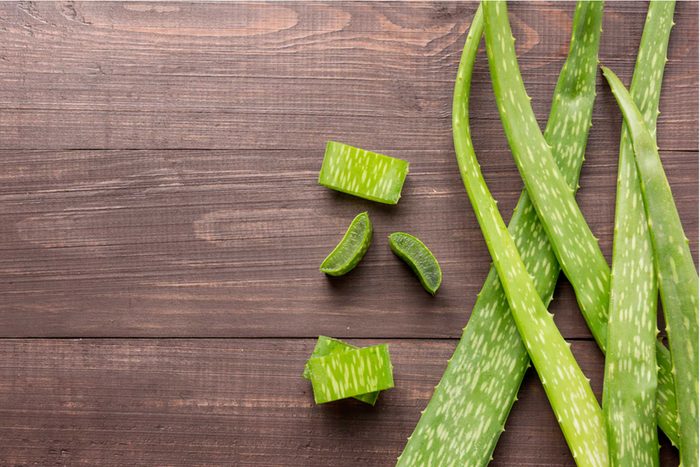
Consider GI helpers
According to certified health and wellness coach Nicole Granato, it’s important to focus on anything that helps your gut health. “A daily tonic may be your ticket to healthy bowel movements,” she says.

Cut back on dairy
For some people, dairy can cause health issues, most of which relate to digestion and involve gas, bloating, constipation, and fatigue. “When we ingest milk we get all of these crazy symptoms, which is our body’s way of telling us it does not know how to process it,” says Granato. If it’s an issue for you, steering clear of dairy may streamline your digestion for better metabolic performance.
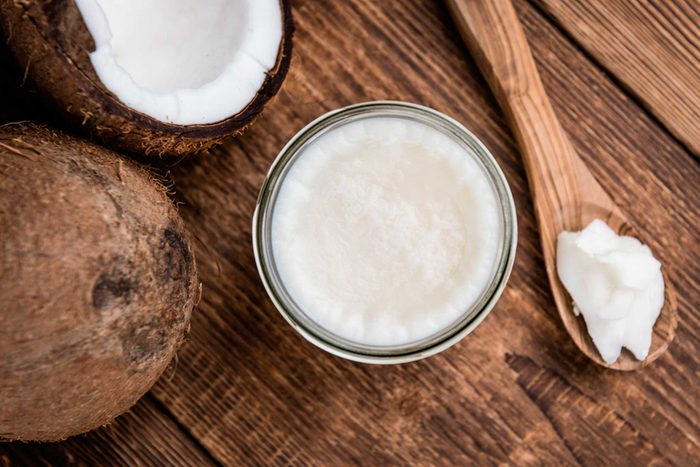
Coconut oil
We’ve all heard the back and forth about the health benefits of coconut oil. (Here’s what the American Heart Association says about coconut oil.) “Coconut oil is made up of medium-chain triglycerides (MCTs), which are metabolized differently in the body than most fats,” says registered nurse Rebecca Lee. “MCTs are transferred quickly from the digestive tract to the liver, and are converted into an immediate source of energy.” Coconut oil may curb your appetite due to the way MCTs are metabolized in your body, she says. Granato suggests adding a teaspoon of coconut oil to your tea, coffee, or smoothie. Here are the common foods that are messing with your metabolism.
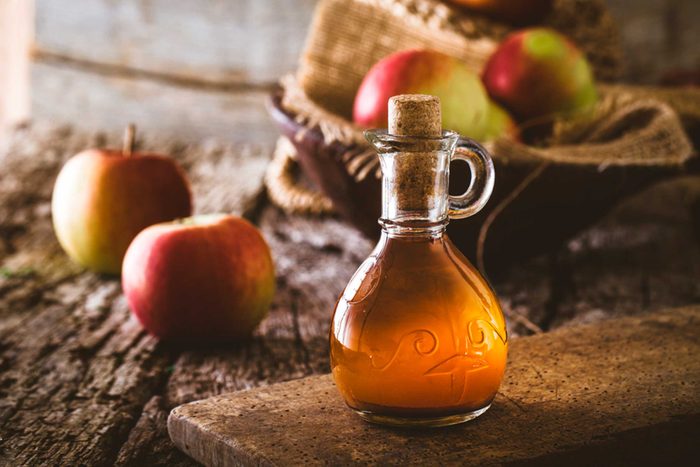
Consider apple cider vinegar
A study carried out in obese people in Japan in 2009 suggested that participants who consumed apple cider vinegar every day for 12 weeks lost more weight than those who took a placebo. As well as containing some vitamins and minerals, vinegar is believed to increase the sense of satiety after meals. (Here are 14 ways apple cider vinegar may benefit your health.)

Ditch the fad diet
Warning: Fad diets can mess with your metabolism and actually make you gain more weight in the long run. “When you cut out vital nutrients from your diet, you drastically slow down your metabolism,” explains Lee. “While fasting in itself is not bad, and may actually be recommended by some doctors, it becomes harmful when it’s done for extended periods of time. With fad diets, especially juice cleanses or detox diets, you are actually losing only water weight and not fat. Once you complete your diet and start eating normal foods again, you will gain back everything you lost due to a slower metabolism, if not more.” If you are thinking about a detox, read this first.
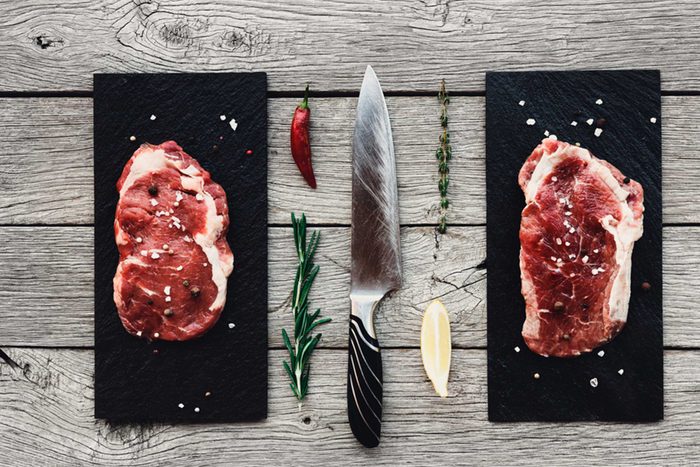
Eat protein at every meal
Consuming protein at every meal not only helps you feel satisfied, but it also increases thermogenesis (the process by which your body burns calories to produce heat). According to “The Effects of High Protein Diets on Thermogenesis, Satiety and Weight Loss: A Critical Review,” published in 2004 in the Journal of the American College of Nutrition,” there is convincing evidence that a higher protein intake increases thermogenesis and satiety compared to diets of lower protein content.” Here’s how to get more protein in your diet.
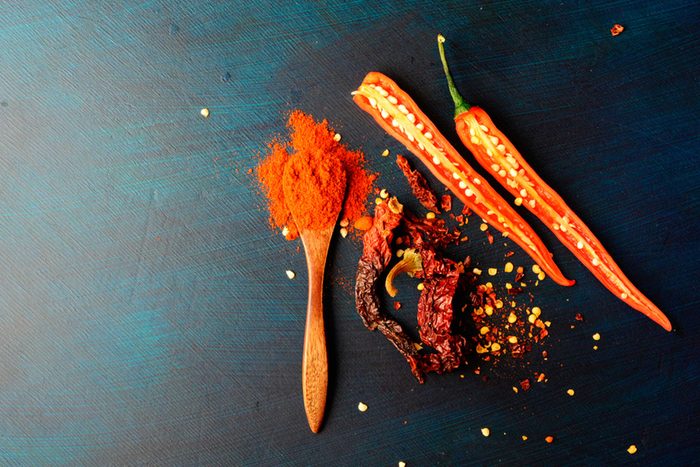
Spice up your meals
Not only can hot, spicy foods like chilies, red pepper flakes, jalapeños, and Sriracha kick up your metabolism slightly, but they also have another benefit for weight loss. “People tend to consume spicy foods more slowly, so by turning up the heat in your meals you may eat less,” says Pincus. This is how to get the metabolism of a 25-year-old.

Hot water and lemon
Certified health coach Claudia Matles recommends drinking hot lemon water. You can even add cayenne pepper and finely chopped, fresh organic ginger root to your hot water with lemon. Keep in mind though, that lemon water may also damage teeth so don’t overdo it.
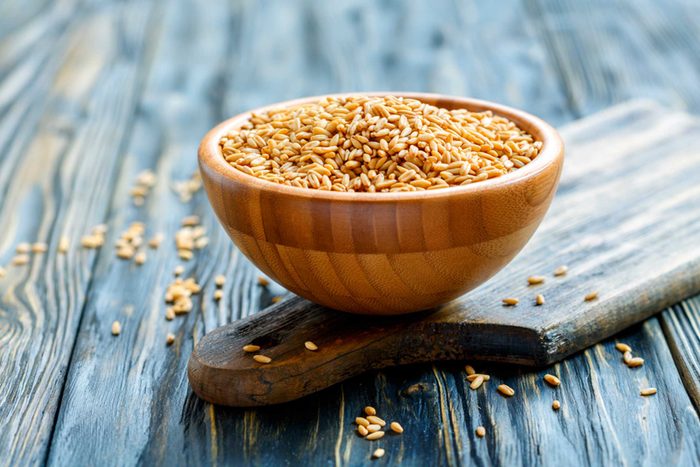
Whole grains
A 2017 study by Tufts University researchers found that eating whole grains (when substituted for refined grains) may boost metabolism, with the reported increase equating to a 30-minute brisk walk. Whole grains—such as barley, oats, unrefined rice, and whole wheat—contain fiber and B vitamins, unlike the refined versions, which often contain little to no fiber. The 2015-2020 Dietary Guidelines for Americans from the United States Department of Health and Human Services and the USDA recommend that Americans replace refined grains with whole grains. The recommended minimum daily allowance of whole grains is three ounces for women and four ounces for men, the equivalent to consuming 1.5 to 2 cups of brown rice or oatmeal each day.

Practice mindfulness
If you want to know how to boost your metabolism without having to exercise or change your diet, consider mindfulness, the art of focusing on the moment. “We live such busy lives leaving us with no time to eat and enjoy our meals,” says Melendez-Klinger. “Studies have shown the benefits of focusing on our hunger cues, taking the time to chewing each bite (15 times recommended) and to savoring and enjoying each bite.” Even busy people can fit mindfulness into their lives with these easy tricks.